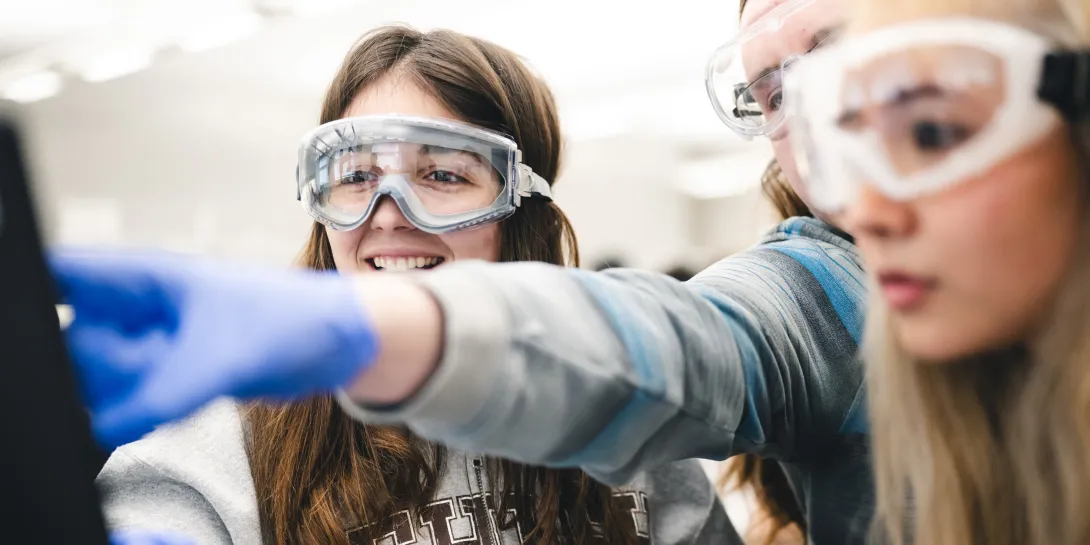Curricular Flexibility for BS/BA Chemistry degree programs
“The chemistry background you need; the flexibility you desire.” The department has defined an essential core of ten chemistry courses that every chemistry major should take. Then additional courses for specialization in areas such as analytical/physical, materials, health professions, pharmaceutical, polymers, business, and others enable students to customize their academic background for the career they wish to pursue.
Interactive Group Study
Several courses in the core and in the customizable curriculum have integrated interactive group approaches to study, such as a studio in introductory chemistry, workshops in organic, and project groups in analytical and physical laboratories. Working in groups enhances learning and student satisfaction.
High Levels of Research Participation
Research is an option that 70% of the majors in chemistry and biochemistry select. Faculty in Chemistry welcome undergraduates into their research groups. Students work on important projects in areas that have a direct impact on society: new diagnostic assays for HIV antigens, pharmaceuticals for rage suppression, drug delivery by novel liposomes, new catalysts for synthesis of fuels and smart surfaces are only a few of the research projects available to undergraduates.
Undergraduate Chemistry Course Catalog with Degree Requirements
B.S. in Chemistry
Our B.S. Chemistry program begins with an introductory freshman course, Chemistry 40 & 41, enhanced by an integrated, advanced laboratory, including extensive workstation-based molecular modeling and computer-interfaced experiments. This course, which averages 30 students, is designed specifically for those considering the pursuit of chemistry-oriented degrees. The course work in the first three years offers an introduction to the breadth of the classical areas of chemistry. The fourth year is largely open for specialization in topics that may be integrated with graduate level course work or courses outside chemistry, such as business. Senior undergraduates typically join research groups, but highly motivated students may begin research earlier, even in their freshman year. The Chemistry Department participates in the existing university Co-op Program, and study abroad is best done in the junior year. Degrees in chemistry are offered in both the College of Arts and Sciences and the College of Engineering and Applied Science, while biochemistry degrees are offered in Arts and Sciences only. Some students with significant advanced placement have completed B.S./M.S. programs in four years, including two summers. The environment and opportunities at Lehigh combine to produce successful chemists who are well-prepared to start satisfying careers.
Academic Plan Example for B.S. in Chemistry
B.A. in Chemistry
The B.A. program in the College of Arts and Sciences is not a pre-professional program and may be elected by students who do not plan to pursue graduate work in chemistry or allied sciences but wish a stronger background in chemistry than is provided by the chemistry minor program. The B.A. program also affords a useful tie-in with health-related chemistry, environmental chemistry, geochemistry or chemistry management options. Students may transfer from the B.S. to B.A. programs or vice-versa as late as the junior year, since basic requirements are the same for the two. Students in the B.A. program who decide to attend graduate school in chemistry, biochemistry, or allied sciences should speak with a department advisor to discuss optional coursework that will prepare them for graduate coursework.
Academic Plan Example for B.A. in Chemistry
B.S. in Biochemistry
The College of Arts and Sciences offers an interdepartmental B.S. in Biochemistry designed for students who want a strong foundation in both chemistry and the biological sciences. The degree is jointly overseen by an interdepartmental committee made up of faculty from the Department of Chemistry and the Department of Biological Sciences. This committee administers the major and helps ensure the curriculum stays current and cohesive across departments. Students may register for the major through either the Department of Chemistry or the Department of Biological Sciences, depending on their interests and advising preferences. The program is currently directed by Dr. Linda Lowe-Krentz, with Dr. Jebrell Glover and Dr. Nathan Wittenberg serving as major advisors. At this time, the university does not offer a minor in biochemistry.
Academic Plan Example for B.S. in Biochemistry
Academic Plan Example for B.S. in Biochemistry on Prehealth Track
B.S. in Pharmaceutical Chemistry
Lehigh’s undergraduate major in pharmaceutical chemistry is a chemistry degree option that focuses on core chemistry, biochemistry and molecular biology to prepare students for careers in the pharmaceutical field. The breadth of knowledge offered by this degree program prepares students for work in this highly interdisciplinary field.
Academic Plan Example for B.S. in Pharmaceutical Chemistry
Minor in Chemistry
The minor in chemistry requires 16 course credits.

